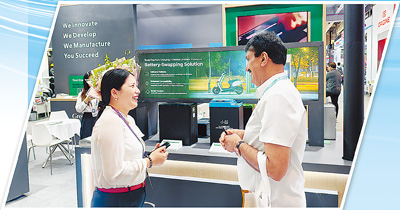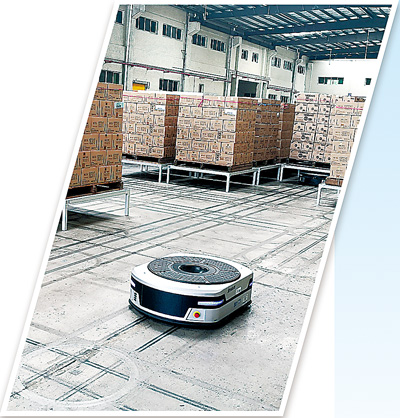




- BRNN
- BRI News
- BRNN News
- Database
Official Documents Polices and Regulations
Inter-government Documents International Cooperation BRI Countries
Business Guide Economic Data BRI Data
Trade
Investment Projects Latest projects
Cases - Content Pool
Dongguan in south China's Guangdong Province is a major hub for foreign trade. It is the world's largest producer of computer components, exports over 500 million pairs of shoes annually, and accounts for 75 percent of global toy exports...
As the world enters a new era of turbulence and transformation, with rising uncertainties in the external environment, how are Dongguan's foreign trade enterprises faring?
The total import and export value of Dongguan increased 17.4 percent year on year to 615.85 billion yuan ($85.95 billion) in the first five months of this year. Reporters visited the city to explore the sources of Dongguan's resiliency during these uncertain times.

An employee of Guangdong Greenway Technology Co., Ltd. based in Dongguan, south China's Guangdong Province negotiates with a foreign client at the China Import and Export Fair, also known as the Canton Fair. (Photo courtesy of the interviewee)
Inside the lithium battery cell and energy storage battery workshop of Guangdong Greenway Technology Co., Ltd., based in Dongguan, automated assembly lines are running at full capacity.
"Our production lines are running at maximum capacity to fulfill orders from the U.S. We're accelerating capacity expansion at our Indonesian factory to enhance our production resilience," said Liu Cong, vice chairman of the company.
Liu added that the company now serves customers in 80 countries and regions worldwide. "We're continuously expanding our market share. Our revenue jumped about 70 percent year on year in the first quarter of this year," she said.
This diversification strategy reflects a broader trend among Dongguan's foreign trade enterprises.
"Over the past few years, Dongguan's foreign trade companies have worked to consolidate traditional markets while exploring emerging ones, making their global footprint increasingly diversified," said an official from the city's commerce bureau.
In 2024, Dongguan's trade with Belt and Road Initiative (BRI) partner countries exceeded 405.45 billion yuan, accounting for 29.2 percent of the city's total import and export volume—a notable increase in proportion. The Association of Southeast Asian Nations (ASEAN) emerged as Dongguan's largest trading partner, while the share of trade with the U.S. declined from 14 percent to 12 percent, reflecting a reduction in Dongguan's dependence on a single market.
The transformation from a processing trade hub to a globally competitive manufacturing center has been supported by Dongguan's comprehensive industrial chains and integrated supply chains.
The city is now advancing rapidly toward high-end manufacturing, with over 220,000 industrial enterprises contributing to a trillion-yuan electronic information industry cluster, along with four additional sectors, each worth hundreds of billions of yuan: equipment manufacturing, new materials, food and beverages, and textiles and garments.
Despite challenges, Dongguan's strong foreign trade performance stems from its optimized market structure and enterprises' ongoing transformation efforts. Innovation-driven transformation has become a consensus among many foreign trade enterprises.
When facing challenges, technological innovation represents the best response, said Xiong Liehua, marketing director of Guangdong Dtech Technology Co., Ltd. in the city.
The company specializes in developing and manufacturing micro-cutting tools essential for electronic circuit board production.

Photo shows a workshop of Guangdong Dtech Technology Co., Ltd. in Dongguan, south China's Guangdong Province. (Photo courtesy of the interviewee)
"Our precision micro-drill bit is now in its fourth generation, and our global market share has increased to 20 percent," Xiong said, adding that the company's annual output value has grown by an average of about 30 percent over the past five years and is expected to increase by more than 20 percent this year.
At an intelligent manufacturing workshop of Hsu Fu Chi, a leading snack and confectionery producer, the entire process—from raw material transportation to finished product inspection—has been largely automated.
"Since implementing our intelligent manufacturing project, production efficiency has increased by 85 percent, and product quality has improved significantly," said Bao Xitao, manufacturing general manager of Hsu Fu Chi.
The intelligent upgrade has enabled the company to stand out amid intense homogenized competition, with its annual output value growing by an average of 8 percent over the past three years, Bao added.

Photo shows an AGV (automated guided vehicle) robot at an intelligent manufacturing workshop of Hsu Fu Chi, a leading snack and confectionery producer, in Dongguan, south China's Guangdong Province. (Photo courtesy of the interviewee)
Driven by intelligent upgrades and digital transformation, Dongguan has actively promoted the modernization of traditional industries.
More than 1,600 enterprises above designated size in traditional industries have completed digital transformation. The city was among the first pilot cities for the digital transformation of small and medium-sized enterprises.
Foreign trade companies in Dongguan have also significantly evolved their operational models. According to the city's commerce bureau, companies have moved from the traditional OEM (Original Equipment Manufacturer) model to mixed strategies targeting both domestic and global markets, with a growing proportion of OBM (Original Brand Manufacturer) and ODM (Original Design Manufacturer) operations.
Amid rapidly changing international trade conditions, many foreign trade enterprises in Dongguan are implementing multi-pronged measures to secure orders, drive transformation, and reduce costs, while also hoping for stronger policy support to ensure sustainable development.
In response, supportive policies have been rolled out progressively. In April, Dongguan introduced 30 measures to stabilize foreign trade, including expanding export credit insurance coverage in an orderly manner, with the value of coverage for emerging markets expected to exceed $5 billion by 2025, and supporting compliant operations of cross-border e-commerce enterprises.
"We will implement these measures thoroughly to promote stable foreign trade growth," the official said.

Tel:86-10-65363107, 86-10-65368220, 86-10-65363106